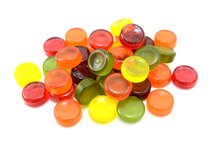Does Candy Make You Gain Weight?
Don't panic that the occasional piece of candy or chocolate bar will cause you to pack on the pounds. Though candy has almost no nutritional value, the only way to gain weight is to eat more calories than you burn. Candy can certainly contribute to weight gain, but the more serious problem is the amount of sugar the sweet treats contain. Added sugar plays a role in weight gain, but it's dangerous to your overall health and well-being, too.
The Science of Weight Gain
As long as you're burning the calories that you consume each day, you'll maintain your weight. If, however, you starting consuming more calories than you're able to burn, you'll start to gain weight. That applies to any type of food, even healthy ones. If, for example, the bulk of your calorie intake is from something nutritious, such as fresh fruit, you'll still gain weight if you eat more calories than you're able to burn. Weight gain isn't as likely with nutritious foods, such as fruits, vegetables, grains and lean meat, as it is with junk food because junk, including candy, usually contains far more calories per serving.
- As long as you're burning the calories that you consume each day, you'll maintain your weight.
- If, for example, the bulk of your calorie intake is from something nutritious, such as fresh fruit, you'll still gain weight if you eat more calories than you're able to burn.
Candy and Weight Gain
Calories in Jolly Ranchers
Learn More
If you eat a lot of candy and don't burn off those extra calories, the sweet treats can certainly contribute to weight gain. The type of candy you choose is to blame, too. That's because the amount of sugar in any one type of candy is a primary factor in how many calories it has. If you eat four pieces of licorice-type candy, for example, you'll consume between 130 and 160 calories, along with between 15 and 17 grams of sugar. An ounce of hard candy clocks in at 112 calories and about 18 grams of sugar. The average milk chocolate bar contains 235 calories and almost 23 grams of sugar. While a serving of candy once in a while isn't likely to cause weight gain, regularly eating it on top of your normal diet might.
- If you eat a lot of candy and don't burn off those extra calories, the sweet treats can certainly contribute to weight gain.
Candy and Health
Perhaps the greater worry with eating a lot of candy is the damage all that sugar can do to your health. Being overweight, from eating too much candy or for another reason, takes a toll on your body and leaves you susceptible to chronic health problems such as heart disease. When you eat large amounts of sugar, your triglyceride levels increase, according to MayoClinic.com. Triglycerides are a kind of fat, too much of which in your bloodstream raises your risk of heart problems. Taking in too much sugar can also raise your risk of Type 2 diabetes, according to the Harvard School of Public Health.
- Perhaps the greater worry with eating a lot of candy is the damage all that sugar can do to your health.
- Triglycerides are a kind of fat, too much of which in your bloodstream raises your risk of heart problems.
Tips and Considerations
Sweet Tarts Nutritional Information
Learn More
When you do splurge on candy, stick to one piece or a tiny serving. You'll still get the sweet taste you're looking for without consuming all that sugar. Sugar-free candy is another option if you're having a hard time kicking the candy habit, though it usually tastes different than the original version. They also contain artificial sweeteners, which aren't good for you either. Opt for healthier sweet treats instead. Fruit, for example, is naturally sweet and also supplies essential vitamins and minerals.
- When you do splurge on candy, stick to one piece or a tiny serving.
- They also contain artificial sweeteners, which aren't good for you either.
Related Articles
References
- U.S. Department of Agriculture: Candies, Twizzlers, Strawberry Twists Candy
- U.S. Department of Agriculture: Candies, Hard
- U.S. Department of Agriculture: Candies, Milk Chocolate
- MayoClinic.com: Sugar: Don't Get Sabotaged by Sweeteners
- Harvard School of Public Health: Public Health Takes Aim At Sugar and Salt
- Do ‘Cheat Meals’ Help or Hurt Your Diet?. Cleveland Clinic. Published June 5, 2018.
- U.S. Department of Agriculture. Dietary Guidelines 2015-2020. Published 2015.
- Wahl DR, Villinger K, König LM, Ziesemer K, Schupp HT, Renner B. Healthy food choices are happy food choices: Evidence from a real life sample using smartphone based assessments. Sci Rep. 2017;7(1):17069. doi:10.1038/s41598-017-17262-9
- Werther's Caramel Hard Candies Nutritional Information. Werther's Original, Storck. Updated July 2018.
- Tootsie Roll Inc. Tootsie Pops Allergy Info & Nutrition.
- Candies, Mars Snackfood US, Skittles Original Bite Size Candies. FoodData Central. U.S. Department of Agriculture. Published April 1, 2019.
- Candy cane. FoodData Central. U.S. Department of Agriculture. Published April 1, 2019.
- Cotton candy. FoodData Central. U.S. Department of Agriculture. Published April 1, 2019.
- Candies, Mars Snackfood US, Starburst Fruit Chews, Original fruits. FoodData Central. U.S. Department of Agriculture. Published April 1, 2019.
- Candies, marshmallows. FoodData Central. U.S. Department of Agriculture. Published April 1, 2019.
- Nutrition Facts Tic Tac
- Smartlabel. Certs Wintergreen Classic Mints
- Mentos. MINT - 14PC ROLL.
- The Hershey Company. ICE BREAKERS Coolmint Mints, 1.5 oz.
- Candies, Twizzlers Strawberry Twists Candy. FoodData Central. U.S. Department of Agriculture. Published April 1, 2019.
- Candies, York Peppermint Pattie. FoodData Central. U.S. Department of Agriculture. Published April 1, 2019.
- Assorted saltwater taffy. FoodData Central. U.S. Department of Agriculture. Published April 1, 2019.
- Milk Chocolate Bar With Almonds. SmartLabel. The Hershey Company. Reviewed September, 2020.
- Candies, KIT KAT Wafer Bar. FoodData Central. U.S. Department of Agriculture. Published April 1, 2019.
- Candies, Mars Snackfood US, SNICKERS Bar. FoodData Central. U.S. Department of Agriculture. Published April 1, 2019.
- Candies, Mars Snackfood US, TWIX Caramel Cookie Bars. FoodData Central. U.S. Department of Agriculture. Published April 1, 2019.
- Candies, NESTLE, BUTTERFINGER Bar. FoodData Central. U.S. Department of Agriculture. Published April 1, 2019.
- Candies, Mars Snackfood US, MILKY WAY Bar. FoodData Central. U.S. Department of Agriculture. Published April 1, 2019.
- S Raatz. The Question of Sugar. U.S. Department of Agriculture. Modified July 24, 2019.
Writer Bio
Sara Ipatenco has taught writing, health and nutrition. She started writing in 2007 and has been published in Teaching Tolerance magazine. Ipatenco holds a bachelor's degree and a master's degree in education, both from the University of Denver.









